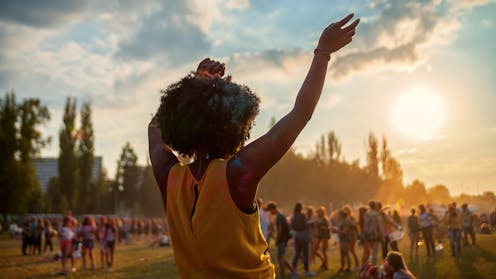
Among the rising tide of loneliness and disconnection, live music is proving to be more than just a good time; it’s a powerful antidote. Whether it’s a pub gig or a stadium show, live music brings people together in ways that matter.
In a recent paper, my colleagues and I reviewed 59 studies of more than 18,000 live music attendees, mostly in Western countries such as the United Kingdom, United States, Australia, New Zealand and parts of Europe.
Here are six ways live music helps alleviate loneliness, based on our and other researchers’ findings.
Opportunities for social connection
Live music events offer people the opportunity to deepen connections with friends, and spark conversations with strangers. They can also act as bridges for people from diverse backgrounds to come together, with music as a common ground.
Music Australia recently reported First Nations and younger audiences are especially likely to value live events as a chance to make new friends, and to feel an enhanced sense of belonging.
Bonding through shared experiences
At heavy metal or punk gigs, the chaos of a mosh pit becomes a surprising display of harmony – despite lyrics of rebellion or anarchy. Strangers move in sync, expressing their private emotions in a communal way.
Research shows syncing to music, even in silent discos, enhances positive feelings and behaviours towards coparticipants. Emotional contagion, or “catching” emotions from the music or other audience members, can also contribute to emotional resonance.
When a crowd shares emotions, movement and even values, a strong feeling of unity can emerge. French sociologist Émile Durkheim called this “collective effervescence”.
Focusing on something bigger
Creative Victoria recently found the primary reason people attend live music is to connect with others and feel part of something bigger than themselves.
Live music can create this communal experience through transcendent emotions. Research into awe-inspiring events reveals they can shift our focus away from ourselves and towards a larger, interconnected whole.
This helps explain why attending live performances can encourage positive social behaviours and reduce loneliness, even if an attendee doesn’t actually speak to anyone.
Sharing one’s authentic self
Live music events, particularly festivals, have been described as “idealised communities” where attendees feel safe to express their authentic selves, free from everyday social constraints.
This “time out of time” experience can be exploratory and liberating, allowing people to connect with others in ways they might not in their regular lives. The safety, trust and respect within these spaces can be particularly empowering for historically marginalised groups, such as LGBTQIA+ and culturally diverse individuals.
Long-term identity building
Shared rituals and artefacts, from Swifties’ wristbands to EDM glow sticks, help live music fans feel like they are part of a meaningful collective. These practices are especially powerful for young people, whose social identities are still developing.
Even during the pandemic, live stream audiences overcame isolation by connecting with others through ritualistic use of emojis and comments.
Long after a show ends, merchandise, band tattoos, online fan forums and recordings of the artist’s music all help sustain feelings of connection with other members of the “scene”.
Music as a social surrogate
Sometimes, live music feels like more than just music. It can feel like a friend: it can listen, empathise and offer comfort when no one else is around.
Research shows music can reduce loneliness by reminding us of real relationships. At times, this can extend to forming parasocial relationships with the musicians themselves, which can offer solace during loneliness. This function of music became especially clear during the pandemic and lockdowns.
Reviving community
Looking at our research, it’s undeniable live music is a beacon of community and inclusiveness in an increasingly disconnected world.
But despite its enormous potential, the industry in Australia is at a crossroads. Post-pandemic recovery has been slow, with engagement in local artists’ events and events at smaller venues (such as pubs and clubs) declining.
Music Australia has found younger people are preferring to stay home for their entertainment. And Creative Victoria reports more than a quarter of the live music market has not attended an event in the past three years, prompting this warning: “These audiences need a compelling reason to entice them to return to in-person attendance.”
Alleviating loneliness, especially among young people, might just be that reason.
Whether it’s through a chance meeting with a like-minded individual at a local gig, or an identity-affirming experience at a festival, live music stands as a universal language that is capable of bringing people together to overcome feelings of isolation.
By recognising its value, we’re not just helping revive an industry – we’re tackling one of society’s most pressing issues.
Nikki Rickard has previously received funding from ARC, and currently has funding from Google. Nikki is currently a Board Member for Music Victoria. Nikki Rickard is an author of the review referenced in this article.
This article was originally published on The Conversation. Read the original article.







